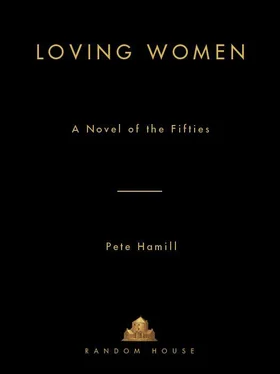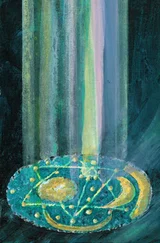She didn’t laugh. She looked at me, her brow furrowed, as I talked, saying things that made sense (and knowing Terry and the Pirates , knowing the Dragon Lady) and she seemed to be thinking: You’re a strange young man .
“Do you draw real people too?” she said.
“Sure.”
“I mean, could you draw, say, that guy in the Jax Beer shirt?”
“I could try.”
I took out the sketchbook and the pencils, and my hands went damp with nerves. Nobody’d ever asked me before to perform with a pencil (and surely this was a performance); I felt the way I used to feel when my mother was alive and we’d go visiting on Sundays and all the cousins would be called to the living room and each of us would be forced to sing. I was always afraid that if I forgot the words — to “Danny Boy” or “The Green Glens of Antrim” or that other cherished Irish tune, “The Marine Corps Hymn”—I would fail my mother in some terrible, final way or give my father the satisfaction of calling me stupid. I’d talked on and on about being an artist; if my hand went dead with clumsiness, if I botched the drawing, she would think I was just another talker. And maybe that’s why she asked: to give me a test, to see if what I said could be matched by what I did. So I had no choice. I looked at the man in the Jax Beer shirt and started to draw. The bulky shape of his body. The pouchy face. Trying to imagine how Caniff would draw him. The first few marks were gray and tentative and then I started drawing with a heavier line, smashing in great patches of black for shadows, seeing the man come off the page, working very fast, adding details (an ear, the hair in the nostrils) and then, at the end, lettering the words Jax Beer in a more delicate way across his back. When I was finished, I handed her the sketchbook.
“Now that is damn good, child,” Eden said. “You really do have some talent. I mean, you have a lot of talent.”
I mumbled something and she touched my hand.
“You’re blushing,” she said.
“Well, it’s, uh—”
“I hope I didn’t make you feel embarrassed.”
“Nah,” I said. “It’s just, you know … drawing is something I usually do alone. It’s funny, doing it in front of somebody.”
“Well, you did it,” she said, and looked again at the drawing and then at the man in the Jax Beer shirt.
“Now you’ve got to sign it,” she said. “And put the date.”
I signed it and tore it out of the sketchbook and handed it to her: gift, souvenir, elaborate hello: she rolled it and slipped it into her purse. “Someday, when you’re rich and famous,” she said, “that’ll be worth a lot of money. I can always say I knew you when.”
That chilled me. Was she making fun? Or was such a thing really possible? The waitress brought two coffees and cleared away the plates. Eden Santana rested her chin on the heel of her hand and stared at me for a long moment.
“Why’d you really ask me to come here?” she said.
“Because you’re so damned beautiful,” I said, then leaned forward to sip my coffee. She kept staring at me.
“You’re serious, awn’t you, child?”
“Yeah.”
“It’s not some damn line.”
“No.”
She took out the Luckies, fumbled with the matches. I took them from her again and struck a match for her. As she inhaled, I examined the cover: Draw Me , it said. I could draw this woman on the matchbook with my left hand. Maybe that’s what I should do, send it in, see if I could win the free correspondence course. Didn’t Roy Crane learn from a correspondence course? But wait: I was in the Navy. Would they send the lessons to me here? And where would I work at the drawings? All this in a fraction of a second, and then I looked up at her. Something had changed in her face: she was more open, somehow younger, not quite as sure of herself, giving up some of her command.
“I haven’t felt beautiful in a long, long time,” she said.
“That’s hard to believe.”
“It’s the truth.”
“Come on — all you have to do is look in the mirror.”
She turned away and watched two sailors in civvies come in the door as the Shore Patrolmen went out. She was blushing again. Then she poked at her coffee with a spoon and took a drag from the cigarette.
“Well, I guess we better go down to that movie,” she said. And I noticed that she wasn’t wearing the wedding ring.
The movie was Seminole with Rock Hudson, all about a brave white man building a farm out in the wilds of Florida, until the Seminole War began and everything went to pot. I think Rock was a West Point graduate too, which made him an officer and made me root for the Indians. But in truth, I wasn’t paying much attention and had trouble following the story. We sat downstairs with a bag of popcorn she insisted on buying. When we finished the popcorn, she handed me a napkin and I wiped my fingers, and sat there, with my hands loose on my knees. And then when some Indians came crashing through a door to slaughter some white woman, she grabbed my hand and held it for the rest of the movie.
Her nails were short and the skin on her fingers was coarse. But there was a damp soft center in her palm and she wrapped her hand around my thumb, holding it snug in the damp core. After a while, she leaned her head against my shoulder and her hair smelled clean and there was a faint flowery odor to her too, soap or perfume, and I wondered what it would be like to kiss her neck and her back, and then I felt her breast against my arm, firm, slippery under the blouse from the silky material of a bra. Was the bra white or black? Did the straps leave marks in her skin? My cock was hard for most of the movie. But I felt something else, sitting there with Eden Santana: it was if we had known each other for a very long time.
Then the movie ended and the lights came on.
“Those poor damned Seminoles,” she said, separating herself from me, smoothing her hair. “All they ever did was let escaped slaves come to Florida to be free and the damned white man came down to get ’em and killed everything in sight.”
“I didn’t know that’s what happened.”
“Sure,” she said. “Read the history, child.”
Then I looked toward the exit and saw Turner leaving. He was in a sports shirt. Beside him was another sailor, also in sports shirt and slacks. Red Cannon.
“You okay?” she said.
“Uh, yeah. There’s a sailor there, you see him, going out? He’s from my base. A real jerk, name of Red Cannon. Let’s wait a minute, till he goes.”
She looked at me in a puzzled way. “You afraid of that man?”
“No. I just don’t want a hassle.”
We waited a bit and then went out. She took my hand and held it, and then we were in the lobby. Outside, standing on the corner, were Turner and Cannon. I hesitated for a moment, thinking: Go back inside, go to the john, let them wander away, avoid seeing them, keep them from seeing you with this woman and then, afraid that Eden would think I was a coward went on out. They turned to look at us.
“Hey, sailor,” Turner said, with a big grin. “See you settled in.”
“How are you, Jack?” I said. I didn’t introduce Eden Santana. I looked at Cannon, and nodded a hello. His eyes were slushy again. “I’ll call you next time I’m at Mainside,” I said to Turner. “Or if you get out to Ellyson, come round to the Supply Shack.”
I started to leave, and Cannon said: “Guess they don’t teach no manners in New York.”
I stopped and looked at him. His eyes were without emotion, staring at me, challenging me, judging me too, judging the whole North, coming on with some smirking kind of southern superiority that I didn’t understand. I didn’t care what Cannon thought, but I wanted Turner’s good opinion.
Читать дальше












